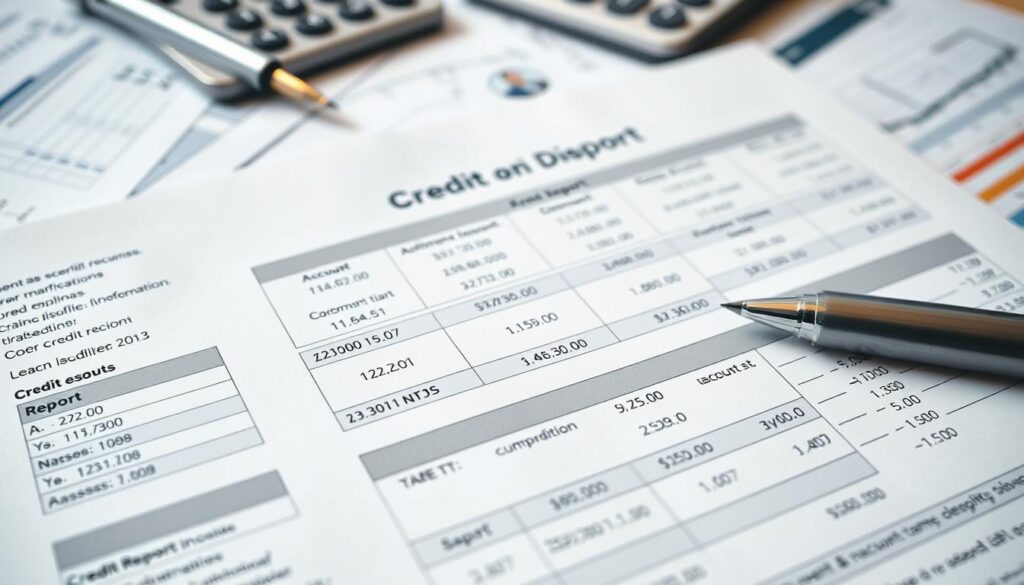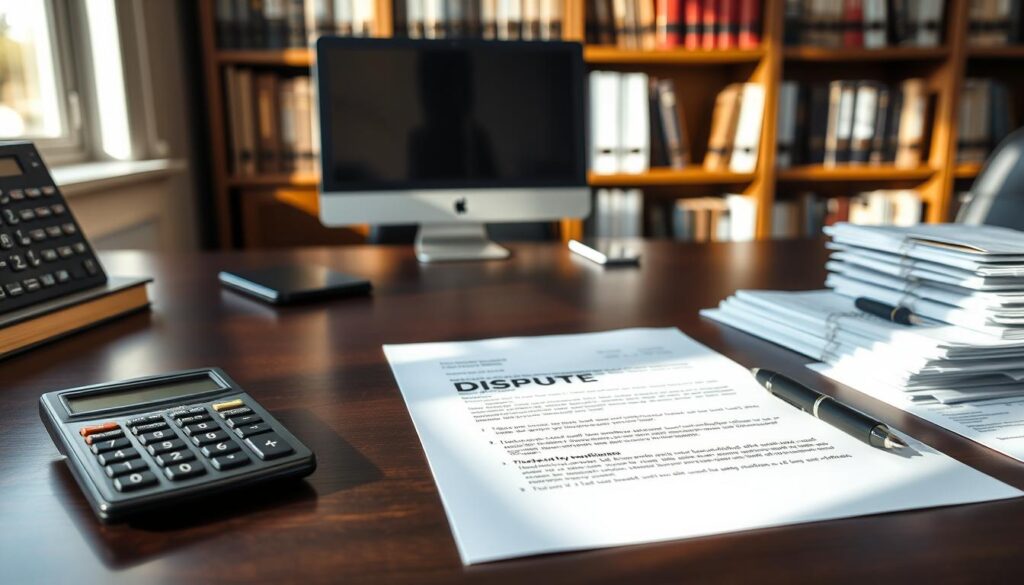An accurate credit report is vital for your financial health. Errors can sneak into your report, hurting your credit score. This can make getting loans, credit cards, or apartments harder.
You have the power to dispute these errors. Our guide offers a template to challenge credit report discrepancies. Use it to take control of your credit profile.
Key Takeaways
- Understand the importance of credit report accuracy and the process of disputing errors
- Obtain your credit reports and identify any inaccuracies or errors
- Utilize a proven credit bureau dispute letter template to effectively challenge the errors
- Learn how to properly submit your dispute and follow up to ensure a successful resolution
- Discover strategies for dealing with persistent credit report issues and maintaining accurate credit reports going forward
Understanding Credit Bureau Disputes
Accurate credit reports are vital for your financial health. Credit bureau disputes help fix errors on your credit report. These mistakes can hurt your credit score and affect your creditworthiness.
It’s important to know how to dispute errors. Addressing these issues can protect your financial future.
What Is a Credit Bureau Dispute?
A credit bureau dispute is a formal request to fix errors on your credit report. You submit this to credit reporting agencies like Experian, Equifax, and TransUnion.
These disputes can address fraudulent accounts, wrong payment histories, or identity theft issues. The goal is to correct any misleading information.
Why Dispute Credit Report Errors?
Correct credit reports help maintain a good credit score. They also improve your chances of getting loans and credit cards.
Errors can make it hard to secure financing or even rent an apartment. Disputing issues ensures your report accurately shows your financial history.
The credit dispute process helps you fix credit report errors. This improves the importance of credit report accuracy for your credit bureau dispute.
“Regularly monitoring your credit report and promptly addressing any discrepancies is a crucial step in maintaining a healthy financial profile.”
Preparing to Dispute Credit Report Errors
Finding errors in your credit reports is crucial for your financial health. Get free reports from Experian, Equifax, and TransUnion yearly. This helps you spot and fix any mistakes affecting your credit profile.
Obtaining Your Credit Reports
You’re entitled to one free credit report from each major bureau annually. Get these reports easily through AnnualCreditReport.com, a site approved by the FTC. Check all three bureaus’ reports for complete information.
Identifying Inaccuracies and Errors
- Carefully examine each section of your credit reports, including personal information, account history, credit inquiries, and public records.
- Look for any incorrect personal details, such as misspelled names, incorrect addresses, or outdated information.
- Verify that all accounts and credit history are accurate and up-to-date, with no unauthorized or fraudulent entries.
- Ensure that any credit inquiries or public records, such as judgments or bankruptcies, are correctly reported and reflect your credit history accurately.
Thoroughly reviewing credit report for errors prepares you to dispute issues with credit bureaus. This helps maintain accurate and positive credit reports.
By identifying credit report inaccuracies, you can take steps to correct them. This process is key to keeping your financial profile in good shape.
| Credit Bureau | Contact Information |
|---|---|
| Experian | P.O. Box 4500, Allen, TX 75013 |
| Equifax | P.O. Box 740256, Atlanta, GA 30374 |
| TransUnion | P.O. Box 2000, Chester, PA 19016 |

“Regularly reviewing your credit reports is the best way to catch and resolve any errors or inaccuracies that could be negatively impacting your financial well-being.”
Writing an Effective Credit Bureau Dispute Letter
A strong credit bureau dispute letter is vital for fixing credit report errors. It can help you communicate your concerns effectively. Let’s explore key elements of a compelling dispute letter.
Components of a Successful Dispute Letter
A well-structured dispute letter format should include the following elements:
- Clear and concise identification of the specific item(s) you wish to dispute on your credit report.
- Detailed explanation of why the information is inaccurate or incomplete, supported by relevant documentation.
- A request for the credit bureau to investigate the disputed item(s) and provide you with the results of their investigation.
- A request for the credit bureau to correct or remove the inaccurate information from your credit report.
- Your contact information, including your full name, address, and any other relevant details.
Crafting an Effective Credit Dispute Letter Content
Focus on providing a clear explanation of the issue in your credit bureau dispute letter. Use a professional tone and avoid emotional language.
Make sure your letter is well-organized and easy to read. Include supporting documents like billing statements or payment receipts to strengthen your case.
“A well-written and well-supported credit bureau dispute letter can be the key to resolving inaccuracies on your credit report.”
Following these guidelines can help you create an effective credit bureau dispute letter. This approach increases your chances of a positive outcome from the credit bureau.
credit bureau dispute letter template
Errors on your credit report can harm your financial health. A credit bureau dispute letter helps fix these mistakes. Here’s a template to get you started.
This template has all the key parts for an effective dispute letter. You can adjust it to fit your specific situation. It’s designed to clearly state your concerns and request corrections.
Key Elements of the Credit Bureau Dispute Letter Template
- Your contact information, including your full name, address, and phone number
- The name of the credit bureau you are disputing (e.g., Equifax, Experian, or TransUnion)
- A clear statement that you are disputing the accuracy of the information on your credit report
- A detailed description of the specific items you are disputing, including the account numbers and any relevant dates
- A request for the credit bureau to investigate the disputed items and provide you with the results of their investigation
- A request for the credit bureau to remove or correct any inaccurate or unverifiable information from your credit report
- A request for the credit bureau to provide you with a copy of your updated credit report once the dispute has been resolved
- Copies of any supporting documentation you have, such as payment receipts or account statements
Using this credit bureau dispute letter template can boost your chances of success. It helps ensure your dispute covers all needed points. This can lead to faster correction of any errors on your credit report.

“Maintaining an accurate credit report is essential for achieving your financial goals. The credit bureau dispute letter template is a valuable tool in your arsenal to protect your credit and financial well-being.”
Submitting Your Dispute Letter
You’ve written your credit bureau dispute letter and gathered supporting documents. Now it’s time to submit your case. This step is crucial for correcting errors on your credit report.
Gathering Supporting Documentation
Strong evidence is key to a successful credit dispute. Collect relevant documents to back up your claims.
- Copies of your credit reports highlighting the errors
- Proof of identity (e.g., driver’s license, social security card)
- Receipts, statements, or other documentation to refute the disputed items
- A copy of your dispute letter
These materials will boost your submit credit dispute letter. They show the legitimacy of your credit dispute supporting evidence. Keep your documents organized and make copies for your records.
Focus on gathering the most relevant evidence when gathering documentation for credit dispute. This increases the chances of a thorough investigation and favorable resolution.
“The more documentation you can provide, the more likely the credit bureau is to investigate your dispute thoroughly and resolve any errors on your credit report.”
Following Up on Your Dispute
Monitoring your credit dispute progress is vital for a favorable outcome. Credit bureaus’ response times can vary, so stay proactive. Track your case status and address any delays or issues that arise.
Credit Dispute Status Check
Expect a confirmation from the credit bureau within a few weeks. This will include a case number for tracking your dispute. Check in regularly to inquire about updates or actions taken.
Credit Bureau Response Timeline
The Fair Credit Reporting Act requires credit bureaus to respond within 30 days. They may extend to 45 days if more information is needed. Follow up if you don’t hear back within this timeframe.
| Credit Bureau | Typical Response Time |
|---|---|
| Experian | 30-45 days |
| Equifax | 30-45 days |
| TransUnion | 30-45 days |
Stay vigilant and follow up on your credit dispute. This ensures the process moves forward and your concerns are addressed promptly. Persistence is key in resolving credit report errors and inaccuracies.
“Monitoring your credit report and following up on disputes is crucial for maintaining a healthy financial standing.”
Dealing with Persistent Credit Report Errors
Credit report errors can be frustrating. If they persist after your initial dispute, it’s time to take action. Let’s explore how to escalate your issue and find solutions.
Escalating Your Dispute
When credit bureaus don’t address your concerns, escalate your dispute. Submit a formal complaint to the Consumer Financial Protection Bureau (CFPB) or your state’s consumer protection agency. These bodies can investigate and ensure compliance.
Gather all relevant documents for your escalation. Include credit report copies, previous correspondence, and evidence supporting your claims. Clearly explain the errors and your resolution attempts.
Stay persistent in your efforts. It may take multiple rounds of escalation to achieve the desired outcome.
Seeking Professional Assistance
If challenges persist, consider hiring a credit repair professional. These experts can navigate the complex dispute process for you. They can escalate credit disputes and explore credit dispute resolution options more effectively.
Credit repair specialists review reports, identify errors, and develop strategies. They communicate with bureaus, manage disputes, and protect your rights. Their services may cost, but the benefits can be worthwhile.
“Persistence is key when dealing with persistent credit report errors. Don’t give up – there are always options to explore until you achieve a favorable outcome.”
Maintaining Accurate Credit Reports
Keeping your credit report accurate is vital for financial strength. Regular checks and proactive management help ensure your credit info stays current. These steps protect your financial health and maintain report accuracy.
Monitoring Your Credit Reports Regularly
Check your credit reports from Experian, Equifax, and TransUnion yearly. This helps spot and fix errors quickly. Get free annual reports at AnnualCreditReport.com.
When reviewing, focus on these key areas:
- Ensure that all your personal information, such as your name, address, and date of birth, is accurate
- Check for any unfamiliar accounts or entries that may indicate identity theft or credit fraud
- Verify that the account balances, payment histories, and credit limits are correctly reported
Regular checks help you spot and fix errors fast. This keeps your credit info accurate and current.
Proactive credit report management is key to a healthy credit profile. It helps you access better credit terms. Taking time to review and fix issues protects your financial future.

| Benefit | Description |
|---|---|
| Maintain Accurate Credit Profile | Regular monitoring helps identify and correct any errors or inaccuracies in your credit report, ensuring your credit profile accurately reflects your financial history. |
| Prevent Identity Theft | Reviewing your credit reports can help you detect and address any signs of identity theft or fraudulent activity, protecting your financial well-being. |
| Access Favorable Credit Terms | An accurate and well-maintained credit report can help you qualify for better interest rates, loan terms, and credit card offers, saving you money in the long run. |
Credit Dispute Letter Best Practices
A well-crafted credit dispute letter can help fix mistakes on your credit report. Using smart methods boosts your chances of removing errors and boosting your credit score. Let’s look at key tips for writing a winning credit dispute letter.
Identify and Document Errors
Check your credit reports from Experian, Equifax, and TransUnion carefully. Look for wrong accounts, payment histories, or personal info. Collect proof like bills or ID to back up your claims.
Maintain a Professional Tone
Write your letter politely and professionally. Stick to facts and avoid emotional language. Your goal is to convince the credit bureau to fix the errors.
Provide Detailed Information
Include specific details about the errors in your letter. List account numbers, dates, and other info to help locate the mistakes. This detail shows your dispute is real and helps the bureau address it.
Follow Submission Guidelines
Learn and follow the credit bureau’s rules for submitting disputes. This may include using certified mail and sending copies of proof. Stick to any time limits or other requirements they have.
Persist and Follow Up
Credit disputes can take time, so be ready to follow up. Keep track of your dispute’s progress. Be prepared to give more info if asked.
If your first try fails, consider taking it higher up. You might also want to ask a credit repair expert for help.
| Best Practice | Description |
|---|---|
| Identify and Document Errors | Thoroughly review credit reports, identify inaccuracies, and gather supporting documentation. |
| Maintain a Professional Tone | Write the letter in a polite and professional manner, focusing on the facts. |
| Provide Detailed Information | Include specific details about the errors, such as account numbers and dates, to aid the investigation. |
| Follow Submission Guidelines | Adhere to the credit bureau’s dispute submission requirements, including sending the letter via certified mail. |
| Persist and Follow Up | Be prepared to follow up on your dispute and provide additional information if needed. |
Use these credit dispute letter best practices to create a strong credit dispute strategy. They’ll help you remove credit dispute letter errors from your report more easily.
Impact of Successful Disputes on Credit Scores
Fixing credit report errors can boost your credit score significantly. Your credit profile becomes more accurate when inaccuracies are removed. This can lead to better interest rates and improved lending terms.
Correcting errors offers benefits beyond a higher credit score. An accurate credit report gives you peace of mind. It can also increase your chances of loan approval and job applications.
Successful disputes can have a remarkable impact on credit scores. Studies show that resolving errors can increase scores by 20 points or more. This boost can improve your overall financial well-being.

